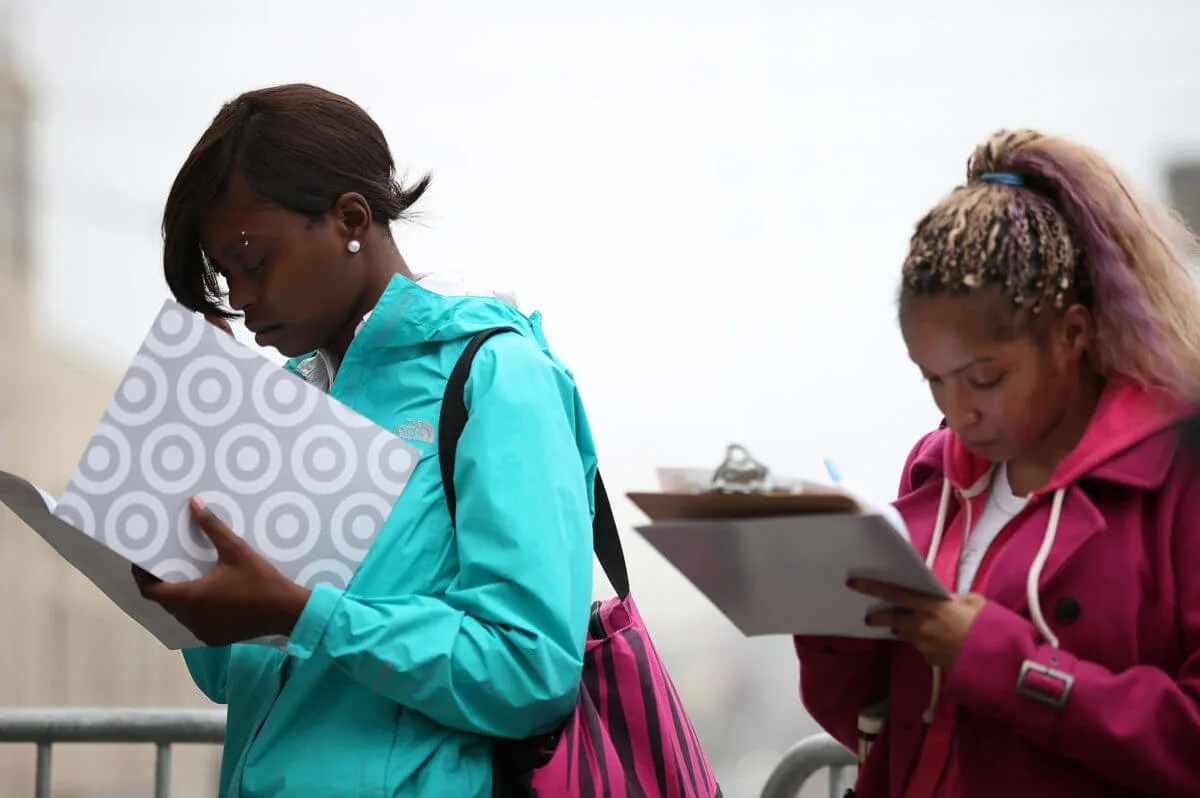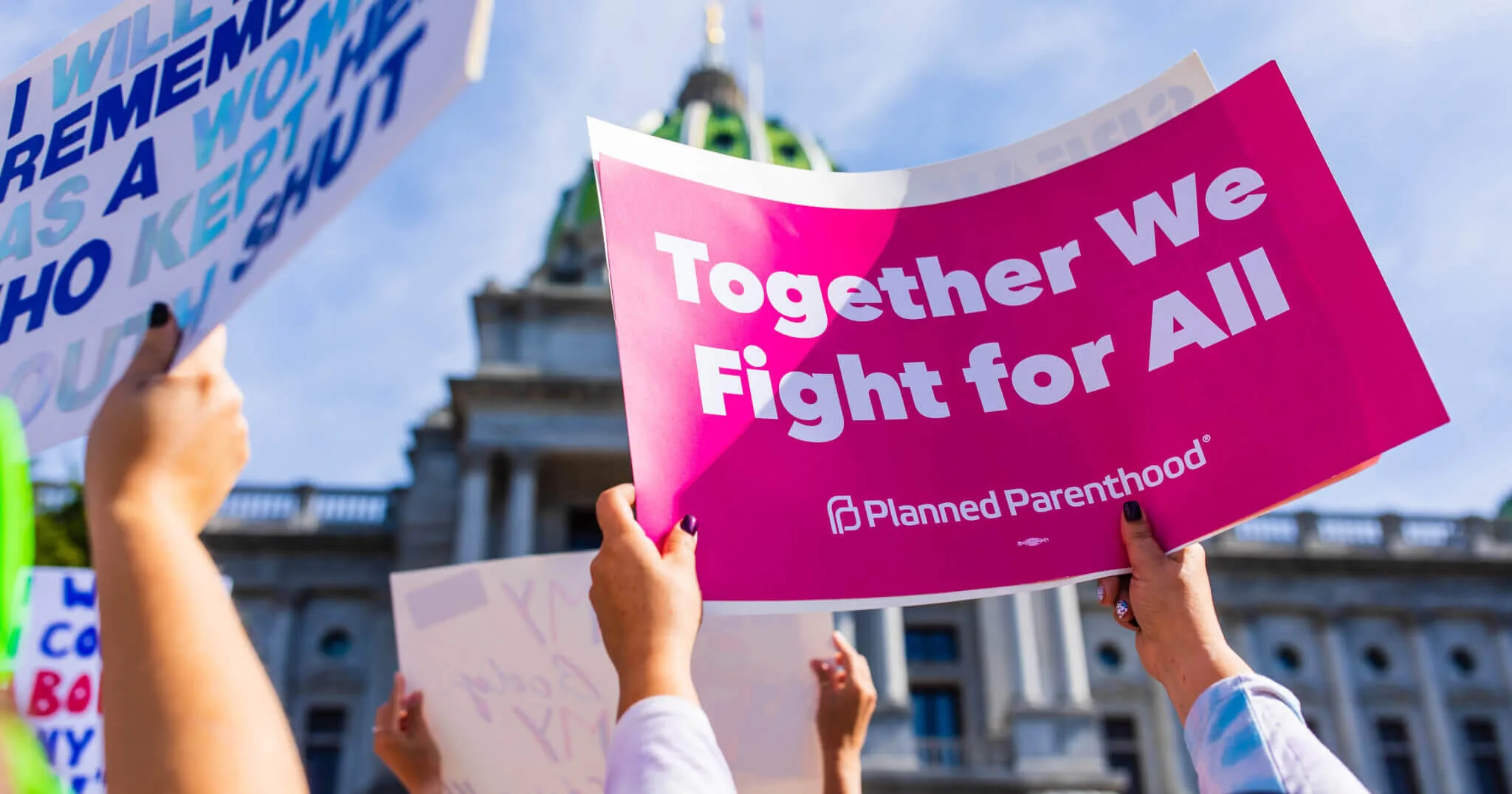
Job seekers fill out applications as they wait in line to enter a job fair at a new Target retail store on August 15, 2013 in San Francisco, California. (Photo by Justin Sullivan/Getty Images)
A new report from the Center for American Progress found that white women have recovered jobs much more rapidly in the economic downturn than Black women.
Between record job losses and the increased pressure of caring for families at home, 2020’s “shecession” threatens to risk an entire generation of women’s jobs, with women of color taking the deepest cuts.
Women of Color Not Regaining Jobs
C. Nicole Mason, chief executive of the Institute for Women’s Policy Research, coined the term “shecession” to describe 2020’s economic crisis—the first time that women’s unemployment reached double digits since the government began keeping track, and the first time women have lost more jobs than men in a downturn. According to a new report from the Center for American Progress (CAP), between February and April, women lost more than 12.1 million jobs while men lost just more than 10 million. Nonwhite women are most affected, with unemployment rates for Black and Hispanic women reaching April highs of 16.4% and 20.2%, respectively.
Sorting Fact From Fiction: Sign Up for COURIER’s newsletter.
“Women of color and Black women in particular are often working an essential job, the front-line jobs that are most vulnerable to COVID—the service-sector jobs, the low-wage jobs, the care-economy jobs,” Diana Boesch, a policy analyst at CAP and co-author of the report, told The Lily. Not only were women of color disproportionately harmed by COVID-19 economic repercussions, but as the “last hired and first fired” trend continues, they’ve had the most trouble being rehired or finding new positions.
At first, this shecession’s job losses were so great that it briefly closed the persistent gap between Black and white unemployment rates. However, CAP found that white women have recovered jobs much more rapidly than Black women. In September, white women held 7.1% fewer jobs than in February, while Black women’s employment was still down by 11.9%. Asian-American women, as well, have suffered great losses this year. In February, that demographic tied with white women at 3% unemployment. But by April, they hit peak unemployment of 15.9% and remained at 11.5% in August—the slowest recovery of any ethnic group from February through August.
Mothers Pay the Price
The fact that mothers, often the sole or primary breadwinners, are also bearing the brunt of family caregiving during the pandemic has worsened their job market prospects. The Economic Policy Institute found that women make up nearly half of all essential workers and the majority of essential workers in health care (76%)—jobs and services that don’t have the option of working from home. Plus, with daycare centers closed or on greatly reduced enrollment, and schools choosing remote learning instruction, many mothers simply cannot fit a full-time job into the equation.
This was illustrated by the fact that September saw the greatest loss of women in the workforce since the pandemic’s worst month of April. Women are burdened with both breadwinning and providing in-home instruction for children, and the dramatically reduced K-12 schooling, aftercare programs, daycare, and other activities make it difficult for partnered women—and nearly impossible for single mothers—to succeed.
The Need for Long-Term Solutions
The shecession that disproportionately harmed the work prospects of women of color and a recovery which is benefiting them the least points to severe, long-term consequences. Women’s employment-to-population ratio hasn’t been this low since 1986, and it took 9.5 years to recover and hit pre-recession numbers.
Bold policies for lasting economic aid and the creation of good jobs for women that include caregiving and paid leave are an absolute necessity, the CAP reports authors write. Without such legislation, women and their families will continue to face a perilous situation, losing career gains and economic input, while facing food insecurity and increased caregiving strain for decades.
READ MORE: How Biden Plans to Help Parents Find Affordable Child Care That Fits Their Needs
Politics

Opinion: Is Reproductive Healthcare just a women’s issue?
In this op-ed, Pennsylvania resident Lynn Strauss discusses the Republican Party’s conflicting stance on reproductive healthcare policy and the...

2 top US gun parts makers agree to temporarily halt sales in Pennsylvania
Philadelphia filed suit against Polymer80 and JSD Supply last year, accusing the manufacturers of perpetuating gun violence by manufacturing ghost...

It’s official: Your boss has to give you time off to recover from childbirth or get an abortion
Originally published by The 19th In what could be a groundbreaking shift in American workplaces, most employees across the country will now have...
Local News

Conjoined twins from Berks County die at age 62
Conjoined twins Lori and George Schappell, who pursued separate careers, interests and relationships during lives that defied medical expectations,...

Railroad agrees to $600 million settlement for fiery Ohio derailment, residents fear it’s not enough
Norfolk Southern has agreed to pay $600 million in a class-action lawsuit settlement for a fiery train derailment in February 2023 in eastern Ohio,...





